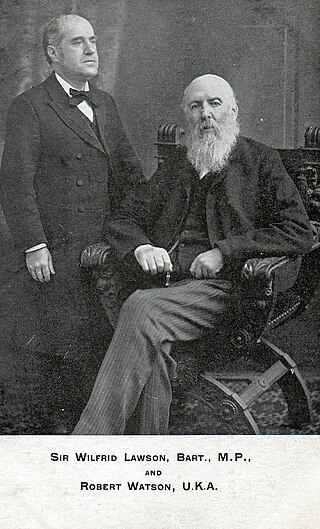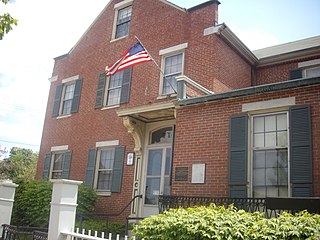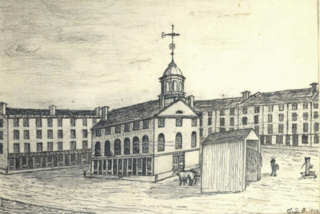
Prohibition is the act or practice of forbidding something by law; more particularly the term refers to the banning of the manufacture, storage, transportation, sale, possession, and consumption of alcoholic beverages. The word is also used to refer to a period of time during which such bans are enforced.

The Eighteenth Amendment to the United States Constitution established the prohibition of alcohol in the United States. The amendment was proposed by Congress on December 18, 1917, and ratified by the requisite number of states on January 16, 1919. The Eighteenth Amendment was repealed by the Twenty-first Amendment on December 5, 1933, making it the only constitutional amendment in American history to be repealed.

Neal Dow was an American Prohibition advocate and politician. Nicknamed the "Napoleon of Temperance" and the "Father of Prohibition", Dow was born to a Quaker family in Portland, Maine. From a young age, he believed alcohol to be the cause of many of society's problems and wanted to ban it through legislation. In 1850, Dow was elected president of the Maine Temperance Union, and the next year he was elected mayor of Portland. Soon after, largely due to Dow's efforts, the state legislature banned the sale and production of alcohol in what became known as the Maine law. Serving twice as mayor of Portland, Dow enforced the law with vigor and called for increasingly harsh penalties for violators. In 1855, his opponents rioted and he ordered the state militia to fire on the crowd. One man was killed and several wounded, and when public reaction to the violence turned against Dow, he chose not to seek reelection.

The Maine Law, passed on June 2, 1851 in Maine, was the first statutory implementation of the developing temperance movement in the United States.

Rum-running, or bootlegging, is the illegal business of smuggling alcoholic beverages where such transportation is forbidden by law. The term rum-running is more commonly applied to smuggling over water; bootlegging is applied to smuggling over land.

The United Kingdom Alliance (UKA) was a temperance movement in the United Kingdom founded in 1853 in Manchester to work for the prohibition of the trade in alcohol in the United Kingdom. This occurred in a context of support for the type of law passed by General Neal Dow in Maine, United States, in 1851, prohibiting the sale of intoxicants.

Prohibition in Canada was a ban on alcoholic beverages that arose in various stages, from local municipal bans in the late 19th century, to provincial bans in the early 20th century, and national prohibition from 1918 to 1920. The relatively large and powerful beer and alcohol manufacturing sector, and the huge working class that purchased their products, failed to convince any of the governments to reverse their stance on prohibition. Most provinces repealed their bans in the 1920s, though alcohol was illegal in Prince Edward Island from 1901 to 1948. By comparison, the Ontario Temperance Act was in effect from 1916 to 1927.

Evergreen Cemetery is a garden-style cemetery on Stevens Avenue in the Deering neighborhood of Portland, Maine. With 239 acres (97 ha) of land, it is the largest cemetery in the state. Established in 1855, in what was then Westbrook, the cemetery is home to one of the state's most prominent collections of funerary art. The 140-acre (57 ha) historical portion of the cemetery was listed on the National Register of Historic Places in 1992.

The alcohol laws of Kansas are among the strictest in the United States, in sharp contrast to its neighboring state of Missouri, and similar to its other neighboring state of Oklahoma. Legislation is enforced by the Kansas Division of Alcoholic Beverage Control.

The Neal Dow House, also known as Gen. Neal Dow House, is an historic house found at 714 Congress Street in Portland, Maine. It was built in 1829 for noted politician and prohibitionist Neal Dow (1804-1897), and was later designated a National Historic Landmark for that association. Dow was the author of the first prohibition law passed by the Maine legislature in 1851. He was known as a tireless, internationally known activist for the temperance movement. Dow's house was a center of activism in his lifetime, and is now the headquarters of the Maine chapter of the Women's Christian Temperance Union.

The History of Portland, Maine, begins when Native Americans originally called the Portland peninsula Məkíhkanək meaning "At the fish hook" in Penobscot and Machigonne in Algonquian. The peninsula and surrounding areas were home to members of the Algonquian-speaking Aucocisco branch of the Eastern Abenaki tribe, who died largely due to the introduction of foreign illnesses during colonization. Some were forcibly relocated to current day New Hampshire and Canada during European settlement.

The Prohibition era was the period from 1920 to 1933 when the United States prohibited the production, importation, transportation, and sale of alcoholic beverages. The alcohol industry was curtailed by a succession of state legislatures, and Prohibition was formally introduced nationwide under the Eighteenth Amendment to the United States Constitution, ratified on January 16, 1919. Prohibition ended with the ratification of the Twenty-first Amendment, which repealed the Eighteenth Amendment on December 5, 1933.

Events from the year 1855 in the United States.

In 1916, the State of Michigan, in the United States, banned the sale of alcohol, three years before prohibition became the national law in 1919. From that point forward, the City of Windsor, Ontario was a major site for Rum-running—alcohol smuggling—and gang activity.
A dry state was a state in the United States in which the manufacture, distribution, importation, and sale of alcoholic beverages was prohibited or tightly restricted. Some states, such as North Dakota, entered the United States as dry states, and others went dry after the passage of prohibition legislation or the Volstead Act. No state remains completely dry, but some states do contain dry counties.

In the United States, the temperance movement, which sought to curb the consumption of alcohol, had a large influence on American politics and American society in the nineteenth and twentieth centuries, culminating in the prohibition of alcohol, through the Eighteenth Amendment to the United States Constitution, from 1920 to 1933. Today, there are organizations that continue to promote the cause of temperance.

Brigadier General James Appleton was an American abolitionist, early supporter of temperance, and politician from Maine.

Teetotalism is the practice of voluntarily abstaining from the consumption of alcohol, specifically in alcoholic drinks. A person who practices teetotalism is called a teetotaler (US) or teetotaller (UK), or said to be teetotal. Globally, in 2016, 57% of adults did not drink alcohol in the past 12 months, and 44.5% had never consumed alcohol. A number of temperance organisations have been founded in order to promote teetotalism and provide spaces for nondrinkers to socialise.

Frederick Neal Dow was an American political activist from Maine. The son of Prohibitionist mayor and presidential candidate Neal Dow, Fred Dow served in a number of political positions during his lifetime, including in the Maine House of Representatives and as Collector of the Port of Portland. During his time in the House, he served as Speaker from 1889-1890. He helped found the Portland Club, an influential Republican all-male social club in Portland's West End. He also owned and served as editor of one of Portland's largest newspapers, the Evening Express, from 1887-1925.


















